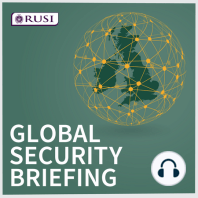48 min listen

Bridging the Oceans #27: What’s All the RAUKUS About? Southeast Asia’s Mixed Response
Bridging the Oceans #27: What’s All the RAUKUS About? Southeast Asia’s Mixed Response
ratings:
Length:
52 minutes
Released:
Nov 24, 2021
Format:
Podcast episode
Description
Originally published 24 November 2021. The defence partnership has divided opinion and frayed some partnerships. For Southeast Asia, the stakes are high, but consensus on AUKUS remains elusive. Veerle is joined by Dr Collin Koh, Research Fellow at the Institute of Defence and Strategic Studies of the S Rajaratnam School of International Studies in Singapore. Dr Koh explains that Southeast Asian countries can largely be divided into three camps in their responses to AUKUS, with a particularly interesting analysis of Cambodia’s strategic outlook. The new partnership highlights once again some difficult questions for Southeast Asian countries regarding how to manage their own regional security, while maintaining ASEAN centrality and navigating growing tensions between the US and Beijing.
Released:
Nov 24, 2021
Format:
Podcast episode
Titles in the series (100)
The UK, Russia and Strategic Stability: This episode examines the re-emergence of the concept of strategic stability as a means of managing security relations between Russia and the transatlantic community and avoiding war. Following Moscow’s annexation of Crimea in 2014 and its military... by Global Security Briefing